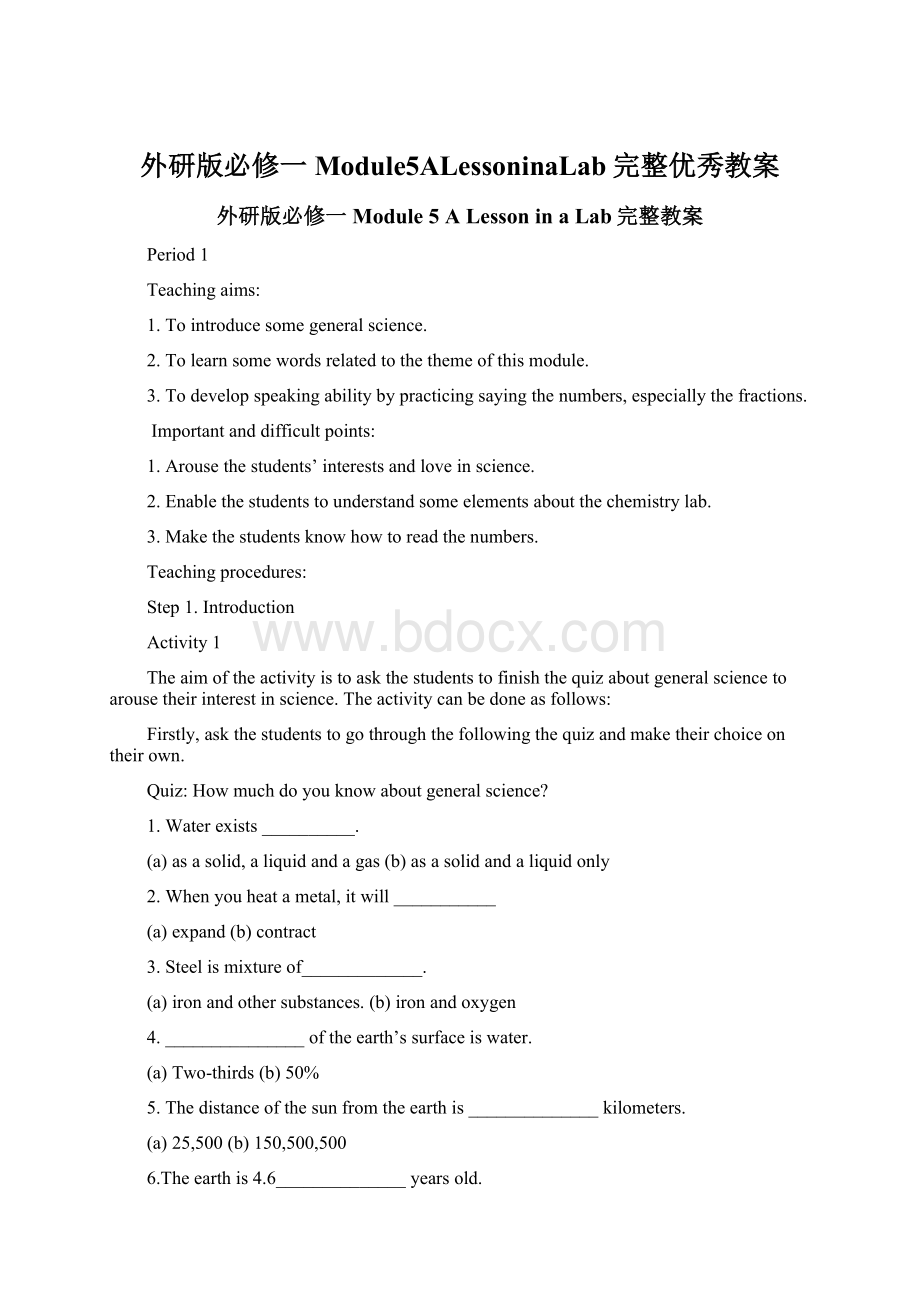外研版必修一Module5ALessoninaLab完整优秀教案.docx
《外研版必修一Module5ALessoninaLab完整优秀教案.docx》由会员分享,可在线阅读,更多相关《外研版必修一Module5ALessoninaLab完整优秀教案.docx(18页珍藏版)》请在冰豆网上搜索。

外研版必修一Module5ALessoninaLab完整优秀教案
外研版必修一Module5ALessoninaLab完整教案
Period1
Teachingaims:
1.Tointroducesomegeneralscience.
2.Tolearnsomewordsrelatedtothethemeofthismodule.
3.Todevelopspeakingabilitybypracticingsayingthenumbers,especiallythefractions.
Importantanddifficultpoints:
1.Arousethestudents’interestsandloveinscience.
2.Enablethestudentstounderstandsomeelementsaboutthechemistrylab.
3.Makethestudentsknowhowtoreadthenumbers.
Teachingprocedures:
Step1.Introduction
Activity1
Theaimoftheactivityistoaskthestudentstofinishthequizaboutgeneralsciencetoarousetheirinterestinscience.Theactivitycanbedoneasfollows:
Firstly,askthestudentstogothroughthefollowingthequizandmaketheirchoiceontheirown.
Quiz:
Howmuchdoyouknowaboutgeneralscience?
1.Waterexists__________.
(a)asasolid,aliquidandagas(b)asasolidandaliquidonly
2.Whenyouheatametal,itwill___________
(a)expand(b)contract
3.Steelismixtureof_____________.
(a)ironandothersubstances.(b)ironandoxygen
4._______________oftheearth’ssurfaceiswater.
(a)Two-thirds(b)50%
5.Thedistanceofthesunfromtheearthis______________kilometers.
(a)25,500(b)150,500,500
6.Theearthis4.6______________yearsold.
(a)million(b)billion
7.Theearthis______________themoon
(a)twiceaslargeas(b)forty-ninetimeslargerthan
Thenputthestudentsinpairstocomparetheiranswersandcallbacktheanswersfromtheclass.
Finallyaskthemtolistentothetapeabouttheabovequizandchecktheiranswers.
Answers:
1.a。
2.a。
3.a4.a。
5.b。
6.b。
7.b.
Activities2&3
Theteachercanpreparesomecardsaboutdifferentthingsfortheclassatfirst.Beforeshowingthestudentsthecards,theteachercansaytothewholeclass:
Thingscanbedividedintothreekinds,natural,man-made,andeithernaturalorman-made,nowI’llshowyousomecardsinmyhand,canyoutellmewhicharenatural,man-madeorboth?
Afterthis,theteachercancontinuetosaytothewholetheclass:
Canyougivesomeexamples?
Thendividethewholeclassintotwobiggroupstocompete.TheteachercanasktheSstospeakoutasmanyexamplesaspossibleandwritedownthewordsinthetableontheblackboardasfollows:
Natural
Eg:
wood,------
Man-made
Eg:
glass,------
Eithernaturalorman-made
Eg:
water,------
Finally,asktheSstoopentheirbooksatPage41andreadthewordsintheboxaloud.Ifpossible,theycanlookupthewordstoknowwhattheymean.Ofcourse,theabovecompetitionwillcontinue,thatistosay,atthismoment,theteachercanasktheSstoputthewordsintheboxonPage41intheirbooksintheabovetable.
Step2.VocabularyandSpeaking
Activity1
Theaimoftheactivityistohavethestudentsknowhowtoreadthelongnumbers.Sotheactivitycanbedonelikethis:
Beforedealingwiththeactivity,theteacherhadbetterbuildupalongnumberby
havingthestudentssayanincreasingsequence,eg:
3three
33thirty-three
333threehundredandthirty-three
3,333threethousand,threehundredandthirty-three
33,333thirty-threethousand,threehundredandthirty-three
Atthistime,mostoftheSswillknowthewayofreadingtheselongnumbers:
wheretosay“million”,“thousand”,and“hundred”.Soinordertoconsolidatewhattheyjustlearned,theteachercanpracticesayingthenumbersatthetopofPage42withthestudentstomakesuretheSshavethecorrectintonation.
ThenasktheSstogothroughtherestofthenumbersinActivity1andfindtheerrorsindividuallyaccordingtothedirections.
Finallytheteachercallsbacktheanswersfromtheclass.
Answers:
1)Theword“thousand”ismissingafter“fourhundredandseventy”。
2)Theword“one”(or“a”)ismissingbefore“hundredmillion”.
Activity2
Firstly,theteacherpointatthefractionsandsaytheminEnglish.AtthesametimetheteacherhavetheSsrepeatthemafterhimorher.
ThentheteacherandtheSsmakeananalysisabouttherulesofreadingfractionsinEnglishtogether.
FinallytheteacherasktheSstoreadtherestofthefractionsinActivity2onPage42intheirbooksinEnglishontheirown.Ifnecessary,theteachercanwritedownthecorrectanswersontheblackboardtocheckwhattheyread.
Answers:
1.two-fifths。
2.five-eighths。
3.nine-tenths4.three-eighths。
5.five-sixths.
Activity3
Theteachershouldintroducetheconceptofpercentageatfirst,andthentheteacherwritedownsomepercentagesontheblackboardandreadthemoutinEnglish.
Eg:
35%→thirty-fivepercent(or:
35percent)。
50percentequalsahalf.
ThenhavetheSspracticereadingaloudthefollowingpercentages:
40%。
55%。
85%.
FinallyhavetheSsworkinpairstodescribethefractionsinActivity2aspercentagesinEnglish.
Answers:
1.Aquarteristhesameas25%。
2.Onethirdisthesameas33.33r%(thirty-threepointthreerecurringpercent)。
3.Four-fifthsisthesameas80%。
4.Onetenthisthesameas10%。
5.Three-quartersisthesameas75%。
6.Onehalfisthesameas50%。
7.Two-thirdsisthesameas66.66r%(sixty-sixpointsixsixrecurringpercent)。
8.Two-fifthsisthesameas40%。
9.Five-eighthsisthesameas62.5%(sixty-twopointfivepercent)。
10.Nine-tenthsisthesameas90%。
11.Three-eighthsisthesameas37.5%(thirty-sevenpointfivepercent)。
12.Five-sixthsisthesameas83.33r%(eighty-threepointthreerecurringpercent).
Step3.Homework
1.Previewthereadingpart.
2.WorkinpairstofinishActivities4&5onPage43.
Periods2&3
Teachingaimsanddemands:
1.Tolearnaboutsomevocabularyandknowledgerelatedtoscienceandexperiments.
2.Toknowaboutsomemetalsandgettoknowtheirmainusesinourlives.
3.TomakethestudentsknowhowtodoasimpleexperimentandwritethereportaboutitinEnglish.
4.Todealwithalltheactivities1-6aboutpassageAandpassageBonpage44-45.
5.Todevelopstudents’expressionabilityaswellasreadingabilitybypracticingthesetwopassages.
6.Toraisestudents’interestsinscienceandformtherigorousscientificattitude.
Teachingkeypoints:
1.Tomakethestudentsunderstandandgraspthevocabularyandknowledgerelatedtoscienceandexperiments.
2.Toenablethestudentstoknowhowtoreadsomepassagesaboutsimplescientificexperiments.
Teachingdifficulties:
TomakestudentslearnhowtowriteanexperimentreportinEnglish
Teachingmethods:
⒈CommunicativeApproach
⒉Task-basedApproach
⒊Aural-oralApproachwiththehelpofthemulti-mediacomputerandtherecorder
Teachingaids:
Multi-mediacomputer。
Software。
PowerPoint。
Recorder
Teachingprocedures:
Step1:
Lead-in
Atfirstshowthestudentsthepictureofalabwiththehelpofcomputer.
Thendesignthefollowingquestionsandaskthestudentstodiscussthemingroups:
1.Areyouinterestedindoingscientificexperiments?
2.Supposeyouwanttodoachemicalexperimentaboutsomemetals,doyouthinkitisnecessarytoknowabouthowtheyreactwithothersubstances?
3.Inordertocarryoutanexperimentsuccessfully,whatshouldyouprepareforit?
ThisstepistowarmupthestudentsandraisetheirintereststospeakEnglishinclass.Becauseallthesequestionsareveryclosetothestudents’dailylifeandstudying
Step2.Pre-reading
Teacher:
Sinceyouareinterestedindoingscientificexperiments,nowlet’sgettoknowsomevocabularyandknowledgerelatedtoscienceandexperiments.
AtthesametimeIcantypeoutsomepicturesaboutsomemetalsonthescreenwiththehelpofthecomputerasfollows:
⑴potassium(钾)⑵sodium(钠)⑶calcium(钙)⑷magnesium(镁)
⑸aluminium(铝)⑹zinc(锌)⑺iron(铁)⑻copper(铜)
AsItypeouteachoftheabovepictures,Icanaskthestudentslikethis:
What’sthis?
Andwhatcanitbeusedfor?
Atthismomentthestudents’interestsareprobablyapproachingaclimax.SoIfurtheraskthemlikethis:
Doyouwanttoknowmoreaboutthesemetals?
Anddoyouknowhowwecanusethesemetalsbetter?
Well,thisiswhatwe’llstudyverysoon.
Thisstepisemployedtocreatealanguageenvironmentforstudents’communicationandarousetheirinterestsinreadingpassageAandpassageBonpage44-45
Step3.Reading
PassageA
T:
Well,let’sreadthroughpassageAwiththetapeofitveryquicklytotrytocatchitsmainidea.ThenfinishActivity2onpage44andgiveyourreasons.
Next,asktheSstoreadpassageAverycarefullytofindouttheanswersinActivity3onpage44.Finishthisactivitybymulti-mediacomputer.Itcanbedesignedasfollows:
1.Whichofthemetalsinthetablereactsthemostwithoxygenandwater?
Potassium,calciumandsodium.
2.Whathappenswhenyouheatcalciuminoxygen?
Itburnstoformanoxide.
3.Whichmetalsreactwithsteam?
Magnesium,aluminiumandzinc.
4.Doesironhaveasloworfastreactionwithsteam?
Ithasaslowreaction.
5.Doescopperreactwithwater?
No,itdoesn’t.
PassageB
T:
Well,frompassageAwecanseehowinterestingtheexperimentaboutthereactionofmetalsis!
Butdoyouknowhowwecancarryoutachemicalexperimentinalabsuccessfully?
Andwhatisthecorrectordertodescribeascientificexperiment?
AsktheSstolookatActivity1onpage44andgivethemabout2minutestodiscussit.Thencollecttheanswersfromthem.Atthesametimetypeoutthecorrectansweronthescreenwiththecomputerasfollows:
aim
conclusion
result
method
T:
Now,let’scometosee“Asimplescientificexperiment”!
ThenplaythetapeofpassageBforthestudentsandaskthemtoreadthepassagewiththetapequicklyandfinishActivity4onpage44.
Inordertoleadthestudentstoreadthetextverycarefully,thefollowin